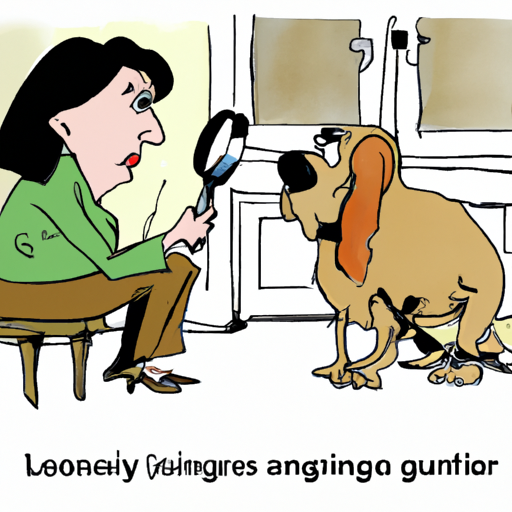If you’re a caregiver to a canine companion, you’ve likely become quite familiar with their overall appearance and behavior. When changes occur, it can be alarming, especially when it comes to your furry friend’s eyesight. A common concern among dog owners is cloudy eyes, a condition that can signify a range of health issues, from minor to severe. But what exactly does it mean when a dog’s eyes are cloudy? In this article, we dive deep into the subject, unveiling the possible causes, symptoms, treatment options, and preventative measures.
Table of Contents:
– Common Causes of Cloudy Eyes in Dogs
– Symptoms to Look Out For
– Diagnosis and Treatment
– Preventative Measures
– Frequently Asked Questions
Key Takeaways:
– Cloudy eyes in dogs can be a sign of various health conditions.
– Early detection and treatment are crucial for your dog’s health and comfort.
– Regular check-ups with a veterinarian can help prevent eye issues in dogs.
Common Causes of Cloudy Eyes in Dogs
Most often, cloudy eyes in dogs are the result of some form of eye disorder. These can range from minor irritations to more severe, sight-threatening conditions.
Here are some common causes:
-
Cataracts: Just like in humans, dogs can develop cataracts, which cause the lens of the eye to become cloudy or opaque. This condition is often age-related but can also be caused by diabetes or trauma.
-
Glaucoma: This condition occurs when there’s an increase in pressure within the eye. It can lead to a hazy or bluish tint in the eye and, if left untreated, can cause blindness.
-
Corneal Ulcers: These are painful sores on the outer layer of the eye that can cause cloudiness. They’re usually the result of trauma, infection, or other diseases.
-
Nuclear Sclerosis: This is a natural aging process in dogs that can make the lens appear cloudy. However, it doesn’t significantly affect their vision.
Symptoms to Look Out For
Besides the obvious cloudiness, there are other symptoms that your dog might exhibit if they’re experiencing eye issues. Watch out for these signs:
- Redness or inflammation around the eye
- Excessive tearing or discharge
- Sensitivity to light
- Difficulty seeing or changes in behavior
- Rubbing or pawing at the eye
If you notice any of these symptoms, it’s crucial to take your dog to the vet as soon as possible. Timely diagnosis and treatment can prevent further complications and ensure your dog’s comfort.
Diagnosis and Treatment
A diagnosis will be made based on a detailed eye examination by a veterinarian, who may use specialized tools to measure eye pressure or view the interior of the eye. In some cases, blood tests may also be conducted to rule out systemic diseases.
The treatment for cloudy eyes in dogs depends on the underlying cause. For instance, cataracts may be managed through surgery, while corneal ulcers might require antibiotic eye drops. Glaucoma, on the other hand, can be treated with medication to reduce eye pressure.
In some cases, the treatment may simply involve managing the symptoms to keep your dog comfortable. For instance, if your dog has nuclear sclerosis, your vet might recommend supplements to support eye health, such as those mentioned in this OneTopDog article.
Preventative Measures
Prevention is always better than cure. Regular check-ups with your vet can help detect eye issues early and keep them under control. Additionally, maintaining your dog’s overall health through a balanced diet and regular exercise can also support their eye health.
Here are a few preventative measures you can take:
- Regularly check your dog’s eyes for any changes.
- Keep their eyes clean and free from irritants.
- Provide a nutritious diet to support their overall health.
For more tips on maintaining your dog’s health, check out this article on OneTopDog.
Frequently Asked Questions
1. Can cloudy eyes in dogs be cured?
The ability to cure cloudy eyes depends on the underlying cause. Some conditions, like cataracts, can often be cured with surgery. Others, like nuclear sclerosis, cannot be cured but do not generally harm the dog’s quality of life.
2. Does cloudy eyes mean my dog is going blind?
Not necessarily. While some conditions that cause cloudy eyes can lead to blindness if left untreated (such as glaucoma), others (like nuclear sclerosis) do not significantly affect vision.
3. How can I tell if my dog’s vision is affected?
Look out for signs like bumping into furniture, difficulty finding toys or food bowls, changes in behavior, or reluctance to go out in dim light or darkness.
The world of canine health can be complex and, sometimes, worrying. Still, armed with knowledge and an attentive eye, you can ensure your furry friend remains happy, comfortable, and well-cared-for. Remember, regular vet check-ups and early intervention are key to managing any health issues, including those affecting your dog’s eyes. For more tips on caring for your dog’s health, check out OneTopDog.



